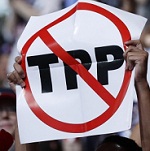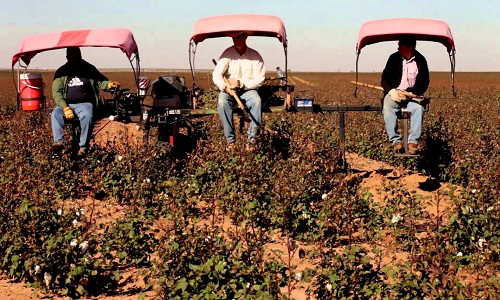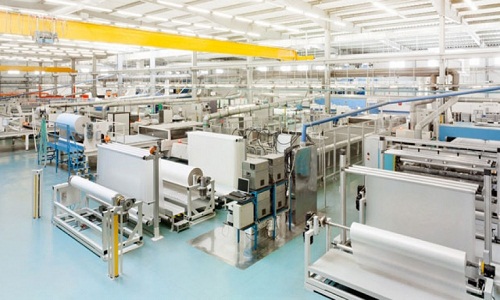FW
"As Fashion Week unfolds on glittering runways, the city’s once-thriving garment manufacturing industry has little to celebrate. Many companies are struggling with rising rents and labor costs and outdated work spaces and losing business to overseas competitors who can make clothes more cheaply. Block after block of factories and showrooms have disappeared from the renowned garment district in Manhattan, replaced by technology, media and consulting companies that focus on the design and marketing side of the business, if they are even connected to fashion."

As Fashion Week unfolds on glittering runways, the city’s once-thriving garment manufacturing industry has little to celebrate. Many companies are struggling with rising rents and labor costs and outdated work spaces and losing business to overseas competitors who can make clothes more cheaply. Block after block of factories and showrooms have disappeared from the renowned garment district in Manhattan, replaced by technology, media and consulting companies that focus on the design and marketing side of the business, if they are even connected to fashion.
There were just 22,626 city residents age 16 and older making apparel, accessories and finished textile products in 2015, a small fraction of the peak of 323,669 workers in 1950, and less than half of the 59,049 workers in 2000, according to an analysis of census data by Queens College.
New lease of life

But now the troubled garment industry is getting a lifeline. New York City officials have stepped up efforts to create a new, modern garment district — this time in Sunset Park, where large industrial buildings, affordable rents and easy access to transit lines and parking have already attracted dozens of manufacturing companies. A $115-million renovation of the city-owned Brooklyn Army Terminal, a former military supply base, will expand manufacturing space there by 500,000 sq. ft. this fall.
City officials have partnered with the Council of Fashion Designers of America, a leading fashion industry group, to help companies across the city to modernise their manufacturing processes and workplaces. A joint program, the ‘Fashion Manufacturing Initiative’, has awarded $1.8 million in grants to 19 companies since 2014 to pay for technology like 3D printers to create accessories, pattern-making and fabric-cutting software that results in less wasted fabric, and equipment that combines the fabric cutting, embroidering and stitching into one step.
Made in New York campaign
A city-financed marketing and advertising campaign ‘Made in New York’ that promotes film and television productions and technology companies, has been expanded to highlight locally made fashions with advertisements on newsstands, bus shelters and in Women’s Wear Daily, a publication that covers the industry. According to Alicia Glen, Deputy Mayor, overseeing the city’s economic development, everybody thinks of fashion as all glitz, but this is a homegrown industry with everyday New Yorkers working behind the scenes. Fashion manufacturing generates employment for lakhs of families and it needs to grow. What’s ‘Made in New York’ is good for New York.
Currently, there are 1,568 garment manufacturing companies in the five boroughs. The largest concentration, 419 companies, remains clustered in or around the garment district, even as manufacturing space there has shrunk to 830,000 square feet from 1.1 mn sqft as recently as 2009.
Steven Kolb, Chief Executive, Council of Fashion Designers of America, says local garment manufacturers were as vital as ever to the city’s fashion industry. Local companies are often more willing to accept small orders and take chances on new designers than overseas manufacturers. They can also turn around clothes more quickly, and their proximity allows designers to monitor production more closely. Because the closer you are to production, the better it is. For many companies, the biggest hurdle is finding an affordable place. UZI has hopscotched from one home to another on the Lower East Side and in Brooklyn, moving each time the rent increased. Today, it makes about 600 dresses a month in a 900-square-foot studio in a walk-up building in Sunset Park. It is so cramped that fabrics have to be stored in another building three blocks away.
Malia Mills is a recent arrival in Sunset Park. Mills moved her company to an 11,000-sq. ft. loft in Industry City, a complex of redeveloped buildings, in 2014 after it outgrew its previous home in the garment district. Mills now has enough space for a fabric library and plans to add more sewing machines and equipment. With this expansion, allied industries are also planning to set foot in the city. The only challenge that needs to be answered is the land cost.
"Right from campaigning days, President Donald Trump had made it clear that he is not in favour of multinational trade agreements viz. NAFTA and the Trans-Pacific Partnership. Last month, he signed an executive order withdrawing the US from the negotiations of the TPP, a free-trade agreement between the US and 12 other Pacific Rim nations. The TPP could abolish foreign taxes in the form of tariffs on the vast majority of US exports of food and agricultural products. Agricultural tariff rates average 19 per cent in Japan and 16 per cent in Vietnam, though some products have peak tariffs of more than 300 per cent, according to the US trade representative."

Right from campaigning days, President Donald Trump had made it clear that he is not in favour of multinational trade agreements viz. NAFTA and the Trans-Pacific Partnership. Last month, he signed an executive order withdrawing the US from the negotiations of the TPP, a free-trade agreement between the US and 12 other Pacific Rim nations. The TPP could abolish foreign taxes in the form of tariffs on the vast majority of US exports of food and agricultural products. Agricultural tariff rates average 19 per cent in Japan and 16 per cent in Vietnam, though some products have peak tariffs of more than 300 per cent, according to the US trade representative.
There is also the 2010 ASEAN-China Free Trade Agreement, which pulls together 10 nations in Southeast Asia. Although the US is not a member, the pact indirectly benefits American cotton farmers and is the catalyst behind the plant's recent surge in price.
Vietnam & US strong ties continue

The US is the world’s largest cotton exporter, supplying approximately 40 per cent of Vietnam’s cotton imports in the last three years, and 50 per cent for the year to date, indicating its increasing share. According to the US Department of Agriculture, American growers are expected to ship the most cotton this season (ending July 31) since 2013. US exporters have already sold 38 per cent of expected shipments, topping the five-year average of 32 per cent to date.
The 2010 ASEAN-China Free Trade Agreement allowed duty-free access of cotton from Vietnam and other ASEAN nations into China. Raw cotton unfortunately didn’t make the cut, facing a 40 per cent above-quota tax. Thus, it made sense that many Chinese-owned mills relocated to Vietnam, import raw cotton and ship the yarn back to China. As a result, approx. 50 to 65 per cent of Vietnam’s cotton imports are spun in foreign-owned mills, with the bulk exported to China.
Earlier this year, China auctioned its mounting cotton reserves, forcing its price closer to global levels. The move revived China’s domestic spinning industry and encouraged more governmental support for yarn spinning in the West of the country. Thus, China became a viable competitor to Vietnam, and added to the already rising demand for US cotton.
China’s three major yarn suppliers are: India, Pakistan, and Vietnam. The latter's growth has been the most impressive, particularly in 2016. Meanwhile growth in Pakistan and India declined, having faced crop shortfalls and tighter stocks. Additionally, yarn exports from major non-ASEAN countries such as Uzbekistan and South Korea experienced declines. Even as yarn spinning shifted from India, Pakistan, Uzbekistan, and to some extent China, into duty-preferred importer countries such as Vietnam, the US has derived an indirect benefit from China’s duty-free ASEAN access.
US withdrawal from TPP…
The TPP would have offered a level playing field for American workers and businesses, resulting in more ‘Made-in-America’ exports and higher-paying jobs. By cutting more than 18,000 taxes various countries put on Made-in-America products, TPP would have allowed US farmers, ranchers, manufacturers and small businesses to compete in some of the fastest growing global markets. Trump’s refusal to negotiate the treaty should be worrisome not only for cotton farmers but for all exporters to Asia.
Welspun India has entered into a co-operation agreement with the Cotton Egypt Association to promote and market Egyptian cotton products worldwide. The two will work together to create programs for the promotion of the Egyptian Cotton logo in retail markets across the globe. The agreement will also help enhance the complete supply chain of Egyptian cotton starting from cultivation to the final product, which will also benefit the Egyptian farmer and the industry as a whole.
Welspun will invest Rs 20 crores in a stage-wise manner over the next few years to support the joint initiatives. Welspun India is also exploring options for expansion of its Egypt operations to include a manufacturing facility for Egyptian Cotton home textile products. It has filed for 27 global patents, of which nine have already been granted.
Welspun India is one of the world’s largest home textile manufacturers. With a distribution network in more than 50 countries, and manufacturing facilities in India, it is the largest exporter of home textile products from India and a supplier to 17 of the top 30 global retailers.
Post verifying Welspun’s quality and supply chain reliability processes, the Cotton Egypt Association has allowed the company to use the Egyptian Cotton logo for five years until 2022.
Vietnam’s leather and footwear industry expects to raise its export value by 10 per cent this year. To achieve the target, the leather and footwear sector needs to boost technological innovation, invest in new equipment and modernise existing equipment, expand the production scale of domestic enterprises to increase productivity as well as improve the quality of products.
Another promising element is the Vietnam-European Union free trade agreement, which will take effect in 2018 and afford Vietnamese footwear makers more opportunities to boost exports. Footwear currently ranks fourth and suitcase-bag-briefcase ranks 10th among Vietnam’s top ten foreign currency earners.
There are plenty of chances for expanding exports given that orders for footwear and bag processing may be diverted from factories in China that have cut back on incentives for investment in garment and footwear manufacturing to focus on high technology. But there are difficulties to be confronted. Orders from the EU market have plummeted. Asean markets have become unstable. Since January 2016, the tax levied on footwear and leather handbags and items circulated within the Asean bloc have been reduced, leading to stiffer competition from regional rivals. Vietnamese enterprises face a shortage of capital and increasing input costs. The sector’s manufacturing index in 2016 rose a modest 3.7 per cent year-on-year.
For Q3 of financial year 2017 Vardhaman Textiles’ consolidated revenue declined 0.3 per cent year on year. EBITDA for the quarter rose 15.4 per cent year on year with a corresponding margin expansion of 329 basis points. EBITDA margin for the quarter stood at 24.2 per cent. This was driven by adjustments in inventories.
PAT for the quarter saw a year on year increase of 31.9 per cent. This was partly driven by a decrease in effective tax rate to 28.5 per cent in the third quarter of financial year 2017 from 31.5 per cent in the third quarter of financial year 2016.
Vardhaman makes almost all types of yarn, barring a few synthetic yarns like 100 per cent polyester. It is a pioneer in cotton, cotton blended, cellulosic. Vardhaman has 1.1 million spindles and it makes 6,00,000 tons of yarn a day. Of the total capacity one-third goes for captive consumption. Another one-third goes for the Indian market. And one-third goes for exports. The company uses innovative fiber blends and it has special products to cater to customers’ needs. Today 50 per cent of its production is of value added yarns for India. Vardhaman is all over India.
The global economic order is expected to shift from advanced to emerging economies over the next few decades. Countries like Brazil, China, India, Indonesia, Mexico, Russia and Turkey are expected to grow at an annual average rate of almost 3.5 per cent over the next 34 years compared to just 1.6 per cent for Canada, France, Germany, Italy, Japan, the UK and the US. The former set of countries would comprise almost 50 per cent of world GDP by 2050 while the second set’s share would be just over 20 per cent.
China has already overtaken the US to become the world’s largest economy in purchasing power parity terms while India currently stands in third place and is projected to overtake the US by 2040. However, to realise this growth potential, emerging market economies need to implement structural reforms to improve macroeconomic stability, diversify their economies away from undue reliance on natural resources and develop more effective political and legal institutions.
Policymakers across the world face a number of challenges if they are to achieve sustainable long-term economic growth. Falling global trade growth, rising income inequality within many countries and increasing global geopolitical uncertainties are intensifying the need to create diversified economies which create opportunities for everyone in a broad variety of industries.
From reinventing traditional dyeing and recycling processes to working toward zero water denim, denim mills are enhancing their sustainable efforts. Italian mill Berto has developed new dyeing systems that can achieve intense casts that are still easy to wash. The dyes, sky and blue, require a lower number of dyeing tanks, lower amounts of water and electricity, and fewer treatments on the garments. The result is denim in a broad range of colors from light blue to black and gray.
Turkey-based mill Bossa is taking a multi-pronged approach to sustainability. It has increased its commitment to BCI cotton from 35 per cent of its total cotton consumption in 2016 to 60 per cent in 2017. In an effort to reduce water use in textile processing, the mill has completely changed the way the fabric is dyed. The ecological dyeing process uses less water and therefore, requires less amount of energy consumption. The resulting look is a bright color reminiscent of old Levi’s.
On fiber technology front, Bossa uses a new generation of elastic staple fiber made from polymer. The polymer is made with bio-based ingredients instead of petrochemicals, eliminating the dependence on fossil fuels. The unique molecular structure provides comfortable stretch and recovery (low growth, shrinkage and less puckering) even after multiple wears.
Atlanta Apparel the fair that caters to young, contemporary fashion accessories was held from February 1 to 5, 2017. More than 26 per cent of temporary exhibitors were new vendors across all categories, including footwear, resort, jewelry and fashion accessories.
Exhibitors from Kentucky to Florida flocked to young contemporary collections that emphasised a wide range of prints and solids, textures and embellishments. Florals, stripes and muted pastels in rayon and modal blends and soft knits were strong. Many pieces featured embellishments such as lace and border prints were on display. Lingerie-inspired pieces that function as foundation layers were popular among juniors, along with flowy, poet-sleeve and cold-shoulder tops. Colored and light denims remained strong, mostly in straight- and skinny-leg silhouettes.
This season, the Atlanta Apparel market expanded the number of temporary exhibitors to more than 1000. At its core, February market is an order writing show, and buyers and exhibitors alike made the most of it. At Umgee’s jam-packed booth, last-minute buyers reviewed crowded racks of bestsellers with an air of frantic contemplation. Umgee’s longtime buyers tend to prefer ordering at shows rather than online.
Boutiques stocked up on bestsellers including bracelets and affordable, easy-to-wear spring separates. Unique and customised casual accessories are what customers are looking for.
Bombay Dyeing, established in 1879, has reported a narrowing of net loss to Rs 52.97 crores for the third quarter ended December 31, 2016. The company had posted a consolidated net loss of Rs 78.15 crores in the same period last fiscal.
Net sales during the period under review stood at Rs 372.6 crores as against Rs 325.77 crores in the year-ago quarter, up 14.38 per cent. In the third quarter this fiscal, cost of materials consumed stood at Rs 221.49 crores as against Rs 207.25 crores a year ago, up 6.87 per cent. The polyester segment posted a revenue of Rs 265.19 crores as compared to Rs 242.64 crores in the same quarter last fiscal.
The retail/textile segment earned a revenue of Rs 70.21 crores as against Rs 48.69 crores while that of real estate had a revenue of 47.22 crores, up from Rs 44.22 crores in the year-ago quarter. The company’s textile products range from towels and bed covers to clothing and fabrics for men, women and children as well as polyester staple fiber. Bombay Dyeing also has a wide range of industrial fabrics that include microdot interlining, fabrics for shoe uppers, adhesives, abrasives, leather cloth and filters.
"Optimistic about market scenario, Aniruddha Deshmukh, MD & CEO, Mafatlal Industries says “We really see a good opportunity in the market.” Mafatlal does B2B and B2C trade and also direct selling to end consumers. He says “These days, consumers are attracted towards innovations. They come to the market to see new offerings. In fashion business, you can’t sell if the product is the same as trends change fast and you have to keep pace with this change. You are supposed to innovate consistently,” Deshmukh explains."

Optimistic about market scenario, Aniruddha Deshmukh, MD & CEO, Mafatlal Industries says “We really see a good opportunity in the market.” Mafatlal does B2B and B2C trade and also direct selling to end consumers. He says “These days, consumers are attracted towards innovations. They come to the market to see new offerings. In fashion business, you can’t sell if the product is the same as trends change fast and you have to keep pace with this change. You are supposed to innovate consistently,” Deshmukh explains.
Staying ahead with innovations

Deshmukh says in women’s wear, there are a lot of prints in the market. Viscose has good demand. “In denim, we are making good movement. We are seeing growth in high-end fashion denim.” Similarly, in white fabric, people are looking for more varieties. Mafatlal has introduced dobbies keeping demand in mind.
Talking about maintaining lead, he adds, “There is distribution channel since we are into B2B and B2C both, we have to be aligned with brands and end consumers. Supply and value chain is another area to work on. Supply chain efficiency and on time delivery matters a lot to stay ahead. Competition is there, all you need to do is find your niche, and start dominating the market.”
Mafatlal Industries is into denim and shirting, as well as school uniform and ready to stitch clothing. “In shirting, we are the leader in white fabric category, which is used for shirting, kurta payjamas etc. Then comes polyester cotton and cotton blends, we do fair amount of prints too such as cotton and viscose prints. We are number one in school uniform segment. We do corporate as well and are leading in this segment. And we are well established in ready to stitch segment,” informs Deshmukh.
Industry views
Since textile does not come under any taxation, the only uncertainty is GST and its applicability on the sector. Rest everything is almost certain, opines Deshmukh. The sector has potential as textile is an essential sector and has to grow. What is needed at this point is how we can generate more employment and contribute to the growth of the sector. “The government is taking a number of initiatives for the betterment of the sector, especially garment sector. States are setting up textile parks and policies to encourage growth,” he avers. Talking about other Asian competitors he says, “Countries such as Bangladesh and Vietnam have big scale setups. They are connected well with overseas companies, and are doing a good job. But the fact of the matter is they don’t have domestic demand and this goes to our advantage. We have an equal opportunity in export and domestic market. Since China is dipping in some areas, it is good for India and we should capitalise on it.”
India needs to boost its exports and domestic markets, he feels. “China is giving us space and we should utilise it. We are the second largest in the world after China in textiles. Indeed Bangladesh and neighbouring countries are growing well in garmenting sector but as far as textiles are concerned, we have the potential to be a global leader,” Deshmukh sums up.












